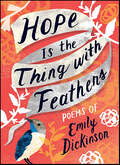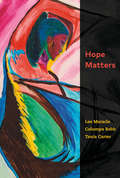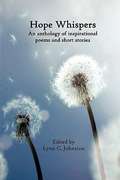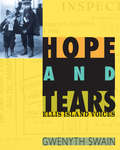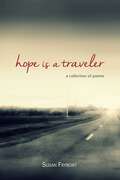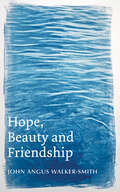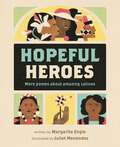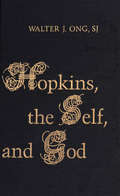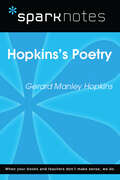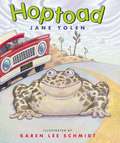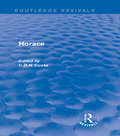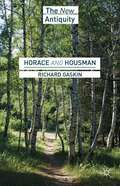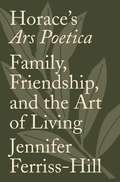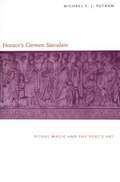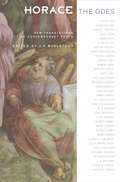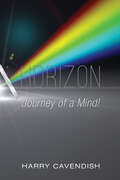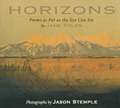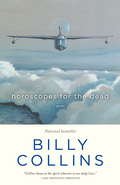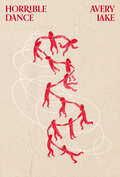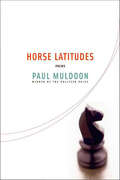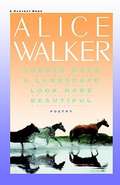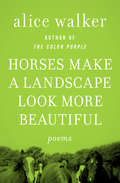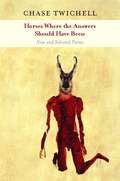- Table View
- List View
Hope Is the Thing with Feathers: Poems of Emily Dickinson
by Emily DickinsonFrom the Women's Voices series, a collection of classic poetry specifically curated to encourage, challenge, and motivate women.One of American’s most distinctive poets, Emily Dickinson scorned the conventions of her day in her approach to writing, religion, and society. Hope Is the Thing with Feathers is a collection of her vast archive of poetry to inspire the writers, creatives, and feminists of today.“Emily Dickinson is one of our most original writers, a force destined to endure in American letters. . . . Without elaborate philosophy, yet with irresistible ways of expression, Emily Dickinson’s poems have true lyric appeal, because they make abstractions, such as love, hope, loneliness, death, and immortality, seem near and intimate and faithful.” —The AtlanticWomen's Voices seriesJane Eyre by Charlotte BronteThe Feminist Papers: A Vindication of Rights of Women by Mary WollstonecraftThe Yellow Wallpaper and Other Writings by Charlotte Perkins GilmanHope Is the Thing with Feathers: Poems by Emily Dickinson
Hope Matters
by Lee Maracle Columpa Bobb Tania CarterThroughout their youth, Columpa Bobb and Tania Carter wrote poetry with their mother, award-winning author Lee Maracle. The three always dreamed that one day they would write a book together. This book is the result of that dream.The wide-ranging poems in Hope Matters focus on the journey of Indigenous peoples from colonial beginnings to reconciliation. But they also document a very personal journey—that of a mother and her two daughters.Written collaboratively, Hope Matters offers a blend of three distinct and exciting voices that come together in a shared song of hope and reconciliation.
Hope Matters
by Lee Maracle Columpa Bobb Tania CarterHope Matters, written by multiple award-winner Lee Maracle, in collaboration with her daughters Columpa Bobb and Tania Carter, focuses on the journey of Indigenous people from colonial beginnings to reconciliation.Maracle states that the book, "is also about the journey of myself and my two daughters." During their youth, Bobb and Carter wrote poetry with their mother, and eventually they all decided that one day they would write a book together. This book is the result of that dream.Written collaboratively by all three women, the poems in Hope Matters blend their voices together into a shared song of hope and reconciliation.
Hope Whispers
by Lynn C. JohnstonDiscover the awesome power that hope and faith play in our physical, emotional and spiritual healing with this collection of more than 80 uplifting and life-affirming poems and short stories. Contributors include noted authors and poets Glenda Barrett, Perry P. Perkins,Lyn Halpern, Francine L. Billingslea, Linda O'Connell, Kathleen Gerard, Robert D. Fertig, Elaine Dugas Shea, Ed Roberts and many others.
Hope and Tears: Ellis Island Voices
by Gwenyth SwainAn original collection of voices, filled with hope and tears, chronicles the history of Ellis Island and the people it served. Indians, settlers, immigrants, inspectors, doctors, nurses, cooks, and social workers all played a big part in that history. Author Gwenyth Swain reimagines the lives of those who landed, lived, and worked on the island through fictional letters, monologues, dialogues, and e-mails, basing them on historical documentation and real-life people. In doing so, she creates a moving picture of their struggles and triumphs. <P><P> Illustrated with poignant and affecting photographs, this is a unique exploration of Ellis Island's history. Includes further resources, bibliography, and source notes.
Hope is a Traveler
by Susan FrybortIn this entrancing poetry collection, Susan Frybort reminds us of the glory that resides at the heart of everyday living. With poems that read like sacred correspondence between our hearts and our essence, we are called to remember the wonderment of life's ever changing tide. Whether it be in the call of a mourning dove, a contemplative shore, or a field of golden wild grass, the reader is left with no choice but to embrace hope in a transitory world.Written with a depth of insight and compassion seldom seen, this is the rarest of first collections. Love and nature poems coalesce like a reverential hymn to the beloved: the beloved at the heart of every breath, the beloved that calls to us as wind, the beloved that resides on the bridge between our hearts. Through Frybort's eyes, there is profound significance in all things perceived small. Absolutely everything is the beloved. Hope is a Traveler is a homage to the miracle of true being.
Hope, Beauty and Friendship
by John Angus Walker-SmithThis selection of poems by a new author was triggered by the tragic death of his 28-year-old daughter. So the collection begins with loss and the aftermath of loss: the hope of the author that his daughter and he may be reunited in the life to come. This hope underlies many of the poems. This is clearly articulated in ‘Osler and Son’, where a father grieves for loss of his son in World War I but in a stoical, unexpressed manner. The author records his childhood experience of emotions being held back in ‘Boys Don’t Cry John’. While some poems look back, most are contemporary, such as those inspired by the lockdown and the Ukraine War. The author advocates expression of feelings. This is powerfully expressed in relation to his experience of Friendship, both past and present. Transcendental beauty is a theme in the metaphysical poems ‘The Colour Blue’ and ‘Roman Glass’. However, each poem is unique. Many of them speak from the heart and have an emotional impact. The author hopes that these will resonate with readers.
Hopeful Heroes: More Poems About Amazing Latinos
by Margarita EngleIn this companion to Bravo!, Margarita Engle's beautiful poetry introduces young readers to lesser-known Latinos from varied backgrounds who have all shown tremendous resilience.Prepare to be inspired by this empowering collection of poetry that tells a larger story about fortitude and community across Hispanic history. From environmental activists such as Christina Figueres to record breaking athletes like Pelé, each role model featured is a legend in their own right. There’s no better time to champion the accomplishments of this remarkable group of unsung heroes from all across Latin America!Those profiled in this collection include Anacaona, Martín de la Cruz and Juan Badiano, Sor Juana Inés de la Cruz, Micaela Bastidas Puyucahua, Simón Bolívar, Mariana Grajales Cuello, Ana Roqué de Duprey, Julio Garavito Armero, Ramón Fonst Segundo, Christiana Figueres, Juano Hernández, Gabriela Mistral, Martín Chambi de Coaza, Marina Núñez del Prado, Noé Canjura, Nicolás García Uriburu, Pelé, and Rigoberta Menchú Tum.
Hopkins Self and God
by Walter J. OngIn these studies Professor Ong explores some previously unexamined reasons for Hopkins' uniqueness, including unsuspected connections between nineteenth-century sensibility and certain substructures of Christian belief.General Manley Hopkins was not alone among Victorians in his attention to the human self and to the particularities of things in the world around him, where he savoured the 'selving or 'inscape' of each individual existent. But the intensity of his interest in the self, as a focus of exuberant joy as well as sometimes of anguish, both in his poetry and his prose, marks him out as unique even among his contemporaries. In these studies Professor Ong explores some previously unexamined reasons for Hopkins' uniqueness, including unsuspected connections between nineteenth-century sensibility and certain substructures of Christian belief.Hopkins was less interested in self-discovery or self-concept than in what might be called the confrontational or obtrusive self - the 'I,' ultimately nameless, that each person wakes up to in the morning to find simply there, directly or indirectly present in every moment of consciousness. Hopkins' concern with the self grew out of a nineteenth-century sensibility which was to give birth to modernity and postmodernity, and which in his case as a Jesuit was especially nourished by the Spiritual Exercises of St Ignatius Loyola, concerned at root with the self, free choice, and free self-giving. It was also nourished by the Christian belief in the Three Persons in One God, central to Hopkins' theology courses and personal speculation, and very notable in the Special Exercises. Hopkins appropriated and intensified his Christian beliefs with new nineteenth-century awareness: he writes of the 'selving' in God of the Father, the Son, and the Holy Spirit. Hopkins' pastoral work, particularly in the confessional, dealing directly with other selves in terms of their free decisions, also gave further force to his preoccupation with the self and freedom. 'What I do,' he writes, 'is me.'Besides being concerned with the self, the most particular of particulars and the paradigm of all sense of 'presence,' the Spiritual Exercises in many ways attend to other particularities with an insistence that has drawn lengthy and rather impassioned commentary from the postmodern literary theorist Roland Barthes.Hopkins' distinctive and often precocious attention to the self and freedom puts him theologically far ahead of many of his fellow Catholics and other fellow Victorians, and gives him his permanent relevance to the modern and postmodern world.
Hopkins's Poetry (SparkNotes Literature Guide Series)
by SparkNotesHopkins's Poetry (SparkNotes Literature Guide) by Gerald Manley Hopkins Making the reading experience fun! Created by Harvard students for students everywhere, SparkNotes is a new breed of study guide: smarter, better, faster.Geared to what today's students need to know, SparkNotes provides:chapter-by-chapter analysis explanations of key themes, motifs, and symbols a review quiz and essay topics Lively and accessible, these guides are perfect for late-night studying and writing papers.
Horace
by Richard F. ThomasThe Carmen Saeculare was composed and published in 17 BCE as Horace was returning to the genre of lyric which he had abandoned six years earlier; the fourth book of Odes is in part a response to this poem, the only commissioned poem we know from the period. The hardening of the political situation, with the Republic a thing of the past and the Augustan succession in the air, threw the problematic issue of praise into fresh relief, and at the same time provided an impulse towards the nostalgia represented by the poet's private world. Professor Thomas provides an introduction and commentary (the first full commentary in English since the nineteenth century) to each of the poems, exploring their status as separate lyric artefacts and their place in the larger web of the book. The edition is intended primarily for upper-level undergraduates and graduate students, but is also important for scholars.
Horace (Routledge Revivals)
by C.D.N. CostaTwo thousand years after his death Horace is still recognised as a unique poet, having exerted marked influence on later European literature. This collection, first published in 1973, explores the different aspects of Horace’s poetic achievement in his main works: the Odes, Epistles¸ Satires and Ars Poetica. The essays, written by internationally-known scholars, include a discussion of the three worlds of the Satires, and a study of Horace’s poetic craft in the Odes – his greatest technical accomplishment. The final chapter is devoted entirely to Horace’s reputation in England up to the seventeenth century as ‘The Best of Lyrick Poets’, and concentrates on the many English translations which he inspired. The expert criticism is illustrated throughout by English translations from the original Latin texts. Horace will appeal to students and scholars of Latin poetry alike, as well as to those interested in the reception of classical literature throughout European history.
Horace And Housman
by Richard GaskinThe lyric poems of Horace and Housman are two enigmatic bodies of work that have much in common, and a close reading of each poet's writings can illuminate the other's. This is the first book to provide a detailed, critical comparison between these two poets, and also the first to make use of Housman's unpublished lectures on Horace.
Horace's Ars Poetica: Family, Friendship, and the Art of Living
by Jennifer Ferriss-HillA major reinterpretation of Horace's famous literary manualFor two millennia, the Ars Poetica (Art of Poetry), the 476-line literary treatise in verse with which Horace closed his career, has served as a paradigmatic manual for writers. Rarely has it been considered as a poem in its own right, or else it has been disparaged as a great poet's baffling outlier. Here, Jennifer Ferriss-Hill for the first time fully reintegrates the Ars Poetica into Horace's oeuvre, reading the poem as a coherent, complete, and exceptional literary artifact intimately linked with the larger themes pervading his work.Arguing that the poem can be interpreted as a manual on how to live masquerading as a handbook on poetry, Ferriss-Hill traces its key themes to show that they extend beyond poetry to encompass friendship, laughter, intergenerational relationships, and human endeavor. If the poem is read for how it expresses itself, moreover, it emerges as an exemplum of art in which judicious repetitions of words and ideas join disparate parts into a seamless whole that nevertheless lends itself to being remade upon every reading.Establishing the Ars Poetica as a logical evolution of Horace's work, this book promises to inspire a long overdue reconsideration of a hugely influential yet misunderstood poem.
Horace's Carmen Saeculare: Ritual Magic and the Poet's Art
by Michael C. J. Putnam"This is the first book devoted to Horace's Carmen Saeculare, a poem commissioned by Roman emperor Augustus in 17 B. C. E. for choral performance at the Ludi Saeculares, the Secular Games. The poem is the first fully preserved Latin hymn whose circumstances of presentation are known, and it is the only lyric by Horace that we can be certain was first presented orally. Michael C. J. Putnam offers a close and sensitive reading of this hymn shedding new light on the richness and virtuosity of its poetry, on the many sources Horace drew on, and on the poem's power and significance as a public ritual.
Horace, The Odes: New Translations by Contemporary Poets (Facing Pages #1)
by HoraceThey have inspired poets and challenged translators through the centuries. The odes of Horace are the cornerstone of lyric poetry in the Western world. Their subtlety of tone and brilliance of technique have often proved elusive, especially when--as has usually been the case--a single translator ventures to maneuver through Horace's infinite variety. Now for the first time, leading poets from America, England, and Ireland have collaborated to bring all 103 odes into English in a series of new translations that dazzle as poems while also illuminating the imagination of one of literary history's towering figures. The thirty-five contemporary poets assembled in this outstanding volume include nine winners of the Pulitzer prize for poetry as well as four former Poet Laureates. Their translations, while faithful to the Latin, elegantly dramatize how the poets, each in his or her own way, have engaged Horace in a spirited encounter across time. Each of the odes now has a distinct voice, and Horace's poetic achievement has at last been revealed in all its mercurial majesty. In his introduction, J. D. McClatchy, the volume's editor and one of the translators, reflects on the meaning of Horace through the ages and relates how a poet who began as a cynical satirist went on to write the odes. For the connoisseur, the original texts appear on facing pages allowing Horace's ingenuity to be fully appreciated. For the general reader, these new translations--all of them commissioned for this book--will be an exhilarating tour of the best poets writing today and of the work of Horace, long obscured and now freshly minted. The contributors are Robert Bly, Eavan Boland, Robert Creeley, Dick Davis, Mark Doty, Alice Fulton, Debora Greger, Linda Gregerson, Rachel Hadas, Donald Hall, Robert Hass, Anthony Hecht, Daryl Hine, John Hollander, Richard Howard, John Kinsella, Carolyn Kizer, James Lasdun, J. D. McClatchy, Heather McHugh, W. S. Mervin, Paul Muldoon, Carl Phillips, Robert Pinsky, Marie Ponsot, Charles Simic, Mark Strand, Charles Tomlinson, Ellen Bryantr Voigt, David Wagoner, Rosanna Warren, Richard Wilbur, C. K. Williams, Charles Wright, and Stephen Yenser.
Horizon: Journey of a Mind!
by Harry Cavendish'There are only trees on this winter scene Their upward pointing leafless twigs are Shrill with the calm of loveliness, And the Sun laughs down, baleful, with a bleary smile.' A book of poetry with imagery and concepts polished over a lifetime of intellectual inquiry. At 58 years old, it is Cavendish’s first collection of poetry and represents the start of his career rather than the end.
Horizons: Poems as Far as the Eye Can See
by Jane YolenHORIZON: 1. the line where earth and sky appear to meet 2. the limit of a person s experience or knowledge. The world has millions of horizons, because wherever you look, the sky seems to meet some part of the earth: a meadow, a mountain, a river, a sand dune, a line of houses stretching across the sky. Perhaps these photographs and poems will stretch your horizons, too, till you can see the long line of sky as a curtain rising above the stage, inviting you to a play, a celebration, a moment of understanding.
Horoscopes for the Dead: Poems
by Billy CollinsBilly Collins is widely acknowledged as a prominent player at the table of modern American poetry. And in this new collection, Horoscopes for the Dead, the verbal gifts that earned him the title "America's most popular poet" are on full display. The poems here cover the usual but everlasting themes of love and loss, life and death, youth and aging, solitude and union. With simple diction and effortless turns of phrase, Collins is at once ironic and elegiac, as in the opening lines of the title poem: Every morning since you disappeared for good, I read about you in the newspaper along with the box scores, the weather, and all the bad news. Some days I am reminded that today will not be a wildly romantic time for you . . . And in this reflection on his own transience: It doesn't take much to remind me what a mayfly I am, what a soap bubble floating over the children's party. Standing under the bones of a dinosaur in a museum does the trick every time or confronting in a vitrine a rock from the moon. Smart, lyrical, and not afraid to be funny, these new poems extend Collins's reputation as a poet who occupies a special place in the consciousness of readers of poetry, including the many he has converted to the genre.Note to Readers: adjusting the size of the type on your e-reading device may affect the line formatting of this eBook. We have formatted the eBook so that any words that get bumped to a new line in a poem will be noticeably indented.
Horrible Dance
by Avery Lake2022 Governor General's Literary Award Shortlist * 2022 A.M. Klein Prize for Poetry FinalistA brilliant poetic debut about gender-based violence that dismantles received definitions of both gender and violence, Horrible Dance is an accomplished addition to transfeminist thought and theory. By turns darkly comic, emotionally connected, playful, incisive, lyrical and irreverent, Lake’s poems navigate a harrowing personal and political terrain with understated, expansive wisdom. Lake persistently returns us to the search for love that lies at the core of relational trauma, even as she shows us how catastrophically such a search can be derailed. This is a rare text able to hold the full velocity of a survivor’s hurt and rage alongside a clear-eyed understanding of the extent and complexity of harm. In their honest accounting of a wide array of bad encounters, these poems point us, again, toward compassion, tenderness, and solidarity. can you forgive mefor how you hurt me so bad—“On Shame”
Horse Latitudes: Poems
by Paul MuldoonThe title of Horse Latitudes, Paul Muldoon's tenth collection of poetry, refers to those areas thirty degrees north and south of the equator where sailing ships tend to be becalmed, where stasis (if not stagnation) is the order of the day. From Bosworth Field to Beijing, the Boyne to Bull Run, from a series of text messages to the nineteenth-century Irish poet Tom Moore to an elegy for Warren Zevon, and from post-Agreement Ireland to George W. Bush's America, this book presents us with fields of battle and fields of debate, in which we often seem to have come to a standstill, but in which language that has been debased may yet be restruck and made current to our predicament. Horse Latitudes is a triumphant new collection by one of the most esteemed poets of our time.
Horses Make a Landscape Look More Beautiful
by Alice WalkerAlice Walker has always turned to poetry to express some of her most personal and deeply felt concerns. She has said that her poems--even the happy ones--emerge from an accumulation of sadness, when she stands again "in the sunlight."
Horses Make a Landscape Look More Beautiful: Poems
by Alice WalkerPoems from the author of The Color Purple: &“This book has two fine strengths—a music that comes along sometimes [and] Walker&’s own tragicomic gifts&” (The New York Times Book Review). The title of this collection comes from a Native American shaman who, reflecting on the terrible problems brought by white colonizers, nearly forgave them all because with the settlers came horses to the North American Plains. And, indeed, in these poems we find Alice Walker seeking a saving grace even in the most difficult circumstances, and in the hearts of the most brutal oppressors. Here Walker&’s attention turns toward the small moments and subliminal exchanges between lovers and enemies, even as her verse addresses concerns as vast as the choking of the planet by war and pollution.This ebook features an illustrated biography of Alice Walker including rare photos from the author&’s personal collection.
Horses Where the Answers Should Have Been
by Chase Twichell"[Twichell's] poems generate the requisite heat with the poet's precise, original and frequently brilliant use of language. . . . A major voice in contemporary poetry." --Publishers Weekly"[Twichell's poems] track the inner movements of one life with an unexpected freshness." --The Washington PostPublishers Weekly called Chase Twichell "a major voice in contemporary poetry," and this long overdue retrospective supports the claim. Selected from six award-winning books, this volume collects the best of Twichell's meditative and startling poems. A longtime student of Zen Buddhism, Twichell probes how the self changes over time and how the perception of self affects the history and meaning of our lives. Her poems exhibit a deep and urgent love of the natural world amidst ecological decimation, while also delving into childhood memories and the surprise and nourishment that come from radical shifts in perception.What etiquette holds us backfrom more intimate speech,especially now, at the end of the world?Can't we begin a conversationhere in the vestibule,then gradually move it inside?What holds us backfrom saying things outright?Chase Twichell is the author of six books of poetry and the best-selling writer's manual Practice of Poetry. She is the founding editor of Ausable Press and lives in rural New York with her husband, the novelist Russell Banks.
